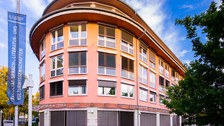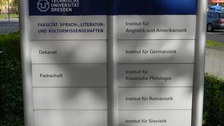Faculty of Linguistics, Literature and Cultural Studies
Table of contents

© Dek_SLK

© Andrea Kiel

© Robert Fischer
Study programs at a glance
For advice on subject-specific questions, you can always - regardless of today's event - contact our student advisory service:
Katharina Fritzsch
Curious now? Even more information about the study program in the Study Information System (SINS)
For advice on subject-specific questions, you can always - regardless of today's event - contact our student advisory service:
Katharina Fritzsch
Curious now? Even more information about the study program in the Study Information System (SINS)
For advice on subject-specific questions, you can always - regardless of today's event - contact our student advisory service:
Katharina Fritzsch
Curious now? Even more information about the study program in the Study Information System (SINS)
Double Degree Program in cooperation with the Università di Trento (Italien)
Program for the event
2 pm – Presentation of the master's programs »Europäische Sprachen« and »Literatur und Kultur im gesellschaftlichen Wandel«
Live presentation and Q&A session with study advisor Katharina Fritzsch
Presentation language: German/English possible during Q&A
Zoom-Link
3 pm – Presentation of the master´s program »Digital Humanities«
Live presentation and Q&A session with study advisor Katharina Fritzsch and dean of studies Prof. Alexander Lasch
Presentation language: German/English possible during Q&A
Zoom-Link
In the master's program Europäische Sprachen, linguistic knowledge can be acquired across disciplines or with a subject-specific focus. The degree program is multilingual. In addition to English and German, the program includes the acquisition or development of at least one Romance, one Slavic, or one Classical language. The choices are French, Italian, Spanish, Russian, Polish, Czech, Sorbian, Greek, and Latin.
(Video language: German)
Margarita and Katharina tell you why they chose the Master EuroS and what makes the program special. © TU Dresden, Fakultät Sprach-, Literatur und Kulturwissenschaften 2021
In the master's program Literatur und Kultur im gesellschaftlichen Wandel, a specialization can be chosen from the subjects represented at the faculty: English and American Studies, German Studies and Media Cultures, Classical Philology, Romance Studies, and Slavic Studies. However, the program also allows students to explore current social issues across disciplines, such as digitization, gender and queer studies, future studies, and environmental humanities. In the third semester, a stay abroad is mandatory. In the video, Jakob takes us through a week of his everyday life as an exchange student in Japan.
(Video language: German)
Jakob studiert den Master LiKWa und hat sich für das Mobilitätsfenster für einen Auslandsaufenthalt in Japan entschieden. Im Vlog nimmt er uns eine Woche lang mit durch seinen Studiumsalltag.
Oliver is also studying for a Master's degree in Literature and Societal Change. As part of his studies, he went on an excursion to Apulia in 2022. (Video language: German)
© TUD 2023
The Master Digital Humanities is aimed at students from the humanities and social sciences who want to learn about and implement the possibilities of digitally supported teaching, research and outreach in practice. Through the elective areas of Society and History, Art and Image, School and Education, and Language and Literature, students gain an in-depth insight into the Digital Humanities at the interface between the humanities and social sciences and actors in cultural, educational, and mediation institutions such as museums, galleries, collections, libraries, and archives. In the video, Prof. Lasch addresses the most important questions about the program.
(Video language: German)
Abschluss Master of Arts und eine umfangreiche Ausbildung für eine digitale Arbeits- und Medienwelt. Das ist der Masterstudiengang Digital Humanities an der TU Dresden. Studiendekan und Professor Dr. Alexander Lasch geht auf die wichtigsten Fragen ein. © TUD GSW
2 Masterabschlüsse in 2 Jahren an 2 Universitäten, in 2 Ländern und das Ganze stipendiengefördert - der Doppelmaster Dresden-Trento. © Doppia Laurea
Sonia Pytkowska tells about her experiences with the double degree program Dresden – Trento.
Presentation of the Faculty
At the SLK faculty, you will not only study one language: In addition to the basics of linguistics and literary studies, you will deal with phenomena such as digitality, politics, gender, and much more on a cultural studies basis. The structure of the program allows you to focus on your interests - interdisciplinarity and internationality are encouraged. Thus, you will be optimally prepared for a career in the knowledge society of the 21st century.
© TUD 2023
What do TikTok, monster plants, theater, and ancient manuscripts have in common? These are all topics that you might encounter in your German Studies. German Studies can be studied as a sub-subject of the Master's programs in European Languages and Literature and Culture in Social Change.
Romanistik ist ein Teilfach des Bachelorstudiengangs Sprach-, Literatur- und Kulturwissenschaften an der TU Dresden. © TU Dresden, 2022
Romance Studies is a sub-subject of the Bachelor's program in Language, Literature and Cultural Studies at the TU Dresden and can be further deepened in the Master's programs in European Languages and Literature and Culture in Social Change.
Vorstellung des Instituts für Klassische Philologie © Redaktion: Carola Queitsch; Dreh & Schnitt: Birgit Nockenberg, Philipp Schulze
Are you interested in the ancient languages Greek and Latin? Then Classical Philology might be the right study for you. You can also deepen this subject in the master's programs of the faculty.
Woher kommt die Redewendung "Alles in Butter"? – "Kurze Frage" an Prof. Alexander Lasch © TU Dresden
"Quick question" for Prof. Alexander Lasch
Where does the saying "Everything's fine" come from?
Getting the train on time, clearing up a misunderstanding with a colleague, being satisfied with life in general - then "everything is fine". But what does it have to do with the yellow grease when everything is in order? Alexander Lasch, Chair of German Linguistics and Language History at TU Dresden, knows the answer to our short question. (Video language: German)
Was hat Fußball mit Politik zu tun? ⚽ – Kurze Frage an Prof. Simon Meier-Vieracker © TU Dresden
"Quick question" to Prof. Simon Meier-Vieracker
What does soccer have to do with politics?
"The ball is now in the new federal government's court": in political reporting, but also in election campaign and Bundestag speeches, metaphors from sport can be found time and again. Soccer in particular seems to lend itself to this. Linguist Prof. Simon Meier-Vieracker reveals why journalists and politicians like to use this rhetorical device so much. (Video language: German)
Warum wünscht man Hals- und Beinbruch? 🤕 | Kurze Frage an Dr. Annelie Bachmaier © TU Dresden
A "quick question" for Dr. Annelie Bachmaier
Why do we wish others good luck?
Why do we wish others a broken leg instead of wishing them good luck? Dr. Annelie Bachmaier works at the Institute of Slavic Studies at TU Dresden and explains where the saying comes from, why we shouldn't take every proverb too literally and why it pays to know the linguistic background. (Video language: German)
© TUD 2023
Established in 1956, DIE BÜHNE is one of the oldest student theaters in Germany and currently offers over 150 theater enthusiasts the opportunity to stage, write and direct plays. Campus reporter Richard takes a look behind the scenes of the murder-mystery play "Es ist einsam auf der Schlossallee". (Video language: German)
Link area
Studying is more than a timetable, lecture hall and books. Therefore, we have compiled a few more useful links. Whether in the lecture hall center, in the lab or in the cafeteria; soon you will know your way around here and then also find the time to discover and enjoy Dresden and its surroundings for yourself.



